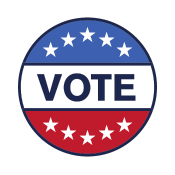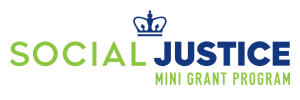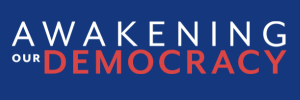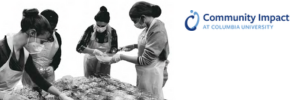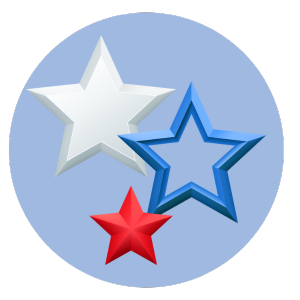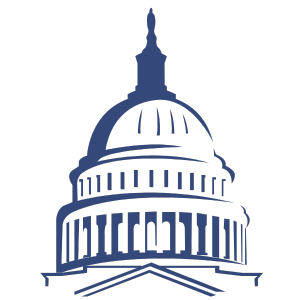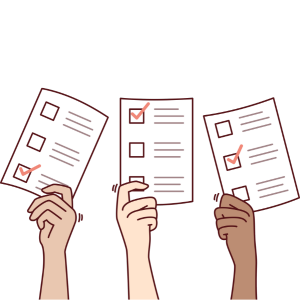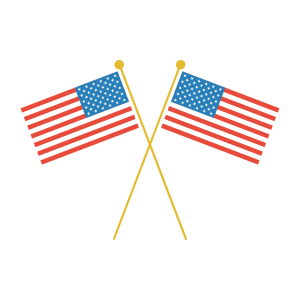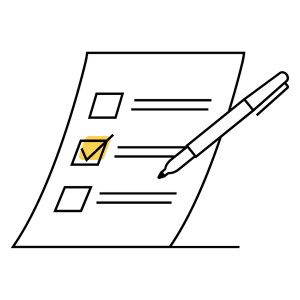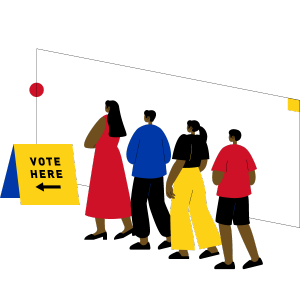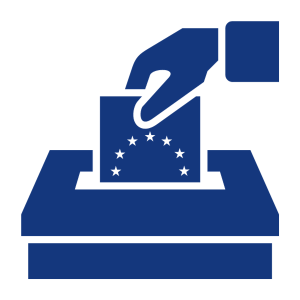CU Engage is a nonpartisan civic engagement initiative, created by University Life and the Office of Government and Community Affairs. CU Engage is supported by a committee of Columbia students and staff, who share opportunities and resources to help you take an active role in shaping our local, national, and global community.
What Is Civic Engagement?
Voting in elections, organizing friends and neighbors around an issue, writing to your elected officials, or learning or debating a topic are some of the ways that you can get involved to build the world you wish to live in. The events and resources below are opportunities for you to have your voices heard.
Please consider taking up these opportunities to learn more and get involved.
These resources can help you prepare to vote, learn about the candidates on your ballot, know your rights, support friends navigating the election system, and more!
- This is your free one-stop shop to navigate the voting process. Make a voting plan, research who and what is on your ballot, confirm your voter registration, navigate regulations around voting by mail, and more.
- Download ALL IN’s 2023 Student Vote Handbook for ideas on how to encourage nonpartisan voter participation in the 2023 elections.
- Understand your state’s voting dates and requirements before heading to the polls with their Rules in Your State page.
- Join their Higher Education-Student Voter Engagement Forum to take part in conversations about improving nonpartisan democratic engagement practices on college campuses.
Get voting information and resources for local NYC elections and by state. Learn how you can register to vote, vote by mail, or vote early on Columbia’s campus.
Learn about candidates and find out when & where to vote during early voting and on Election Day. Enter your address to get started.
Keep this guide handy to learn more about the voting laws in your state or use it as a reference to support a friend who comes from out-of-state.
- The official New York City Board of Elections website provides information about voter registration, becoming a poll worker, running for office, election results and more in New York City.
- The official New York State Board of Elections website provides information about voter registration, becoming a poll worker, running for office, election results and more in New York State.
Learn about VoterID Laws, raise awareness about their impact, and support all eligible voters in making their vote count with VoteRiders.
This non-partisan organization supports U.S. citizens overseas and Uniformed Services members to ensure their voices are heard in elections. This is a great resource if your educational journey takes you out of the United States during election season!
If you have been convicted of a felony, this resource can help you determine if you are eligible to vote right now. It also provides information about the process to restore your right to vote.
- Any voter can call or text 866-OUR-VOTE (866-687-8683) to get information about voting and to report problems they encounter when voting.
- The hotline and website is available in multiple languages:
- Spanish/English: 888-VE-Y-VOTA (888-839-8682)
- Asian Languages/English: 888-API-VOTE (888-274-8683)
- Arabic/English: 844-YALLA-US (844-925-5287)
This resource page from ALL IN to Vote provides information on your rights, emotional support and empowerment, and where you can turn if you face discrimination at the polls.
- Get updates from ALL IN to Vote on how you can apply to be a poll worker.
- Apply to become a poll worker in New York City on the Board of Elections website.
Civic Engagement Opportunities and Resources with University Life
More Civic Engagement Opportunities and Resources
Find and contact elected officials at usa.gov/elected-officials.
- The Office of Government and Community Affairs (GCA) is the University’s primary liaison with federal, state, and local government, as well as with residents, community leaders, and civic organizations in our surrounding neighborhoods.
- GCA supports voter registration and offers stipends for undergraduate students pursuing Congressional internships.
- GCA at CUIMC provides information about policy developments affecting the CUIMC community and coordinates community service in the Washington Heights/Inwood neighborhoods.
Columbia Neighbors connects the University with Upper Manhattan communities. Check out their resources and events pages to get involved.
The Holder Initiative hosts events about social justice issues that are open to all students.
The Knight Institute defends the freedoms of speech and the press in the digital age. Check out their research, upcoming events and educational resources.
Education programs, research projects, and events by Columbia Global Centers offer an opportunity to engage with the world’s most pressing issues.
ICAP, a leader in global public health, offers internship and fellowship opportunities for students in healthcare, public health and related fields.
Take a deeper dive into understanding election-related issues and regulations.

I am an international student at Columbia University. How can I be civically engaged while I am in the U.S.?
Community service is a great way to become civically engaged. Volunteering for nonprofit organizations or organizations dedicated to causes you care about are all ways you can get involved.
Many academic programs at Columbia offer Service Learning courses, where you can get academic credit while serving in the community.
As an international student, you can advocate for a cause you're passionate about. Advocacy work can include letter writing, making phone calls, or lobbying at the local, state, or federal level.
There are many ways you can learn about civic engagement and participate in civic discourse with your peers. Discussing the issues you care about or recent events highlighted in the news with your peers is a great start. You can engage with others across political differences and seek to understand one another. You can also learn by watching town hall or political debates with others and discussing your thoughts on candidates and their stances. You may also want to learn about political polarization and the impact it has on U.S. politics.
Some questions for consideration:
- What is an issue you care about? (For example: climate change, immigration, healthcare, education)
- Research political processes in your home country. Are you able to participate in your country’s political process from abroad?
- What issues in U.S. politics might impact you during your time at Columbia?
Every 10 years the U.S. Census Bureau conducts a census to determine the number of people living in the United States. As an international student you are asked to complete the census. The next U.S. Census will take place in 2030.


